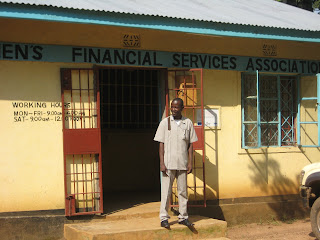There’s really no convenient place to start, so I’ll just start in the middle.
I brought Ombima his first computer last week. Ombima is the manager of the FSA in Luanda, a little market village about 15 km north of the equator. We like to joke that he’s also the clerk, cashier, loans officer, and security guard. You see, the previous Luanda manager was involved in an auto accident while carrying the monthly excess cash from the FSA vault to the more secure link bank in town. This was in January. The bank’s cashier was also involved in the accident, leaving the loans officer the sole remaining employee.
That’s where Ombima comes in. The FSA’s board of directors – a group of various community members, most of them retired teachers and headmistresses, who make key decisions for the bank regarding staffing, loan disbursement, etc. – hired Ombima in February to assist the loans officer in her daily operations. He was originally hired as a cashier but, as luck would have it, the loans officer proceeded to take a maternity leave a few months ago, thrusting the yet-untested Ombima into the captain’s chair. If that wasn’t enough, his own wife is now currently 6 months pregnant with their first child.

I found him in these dire straits during my initial round of visits to the FSAs back in June. The Africa Now vehicle dropped me off at Luanda en route to its primary destination that day in a neighboring community. Prior to this, I’d been vaguely warned by Anthony, the programme manager, that Luanda was the most troubled of the FSAs, based on the monthly financial statistics received (or not received, as was the case with Luanda). This information was not elaborated upon and no other news was forthcoming. I'd have to see for myself.
Ombima greeted me warmly upon my arrival, his grinning face framed by a nappy goatee, his voice low, bouncing and gravelly. He was more than happy to tell me about his FSA; he seemed genuinely proud of what was happening there and gave no hint of any troubles at the bank.
Looking back on it, I suppose it struck me a bit odd that he was working all by himself. But this was my first month in Africa, after all. Surely, things were different here. Allowances had to be made, and I wasn’t about to let my preconceived notions of what a bank is “supposed to be like” interfere with what I encountered here on the ground.
And my initial suspicions were put to rest as Ombima proved himself to be more than competent in his role. An accountant by training, his tireless work ethic and unfailing optimism came off as almost naïve at first. Didn’t he realize that he was working at the weakest link in the FSA chain? Yet he kept talking about the steady progress he was making, going so far as to predict that Luanda would be turning a small profit this month.
His plans were modest, informed by his accounting background, but it was their sheer simplicity that won me over and convinced me that the bank was finally in the proper hands. Forget hello, Ombima had me at “initiate a monthly expense budgeting plan”.
He was currently in the process of updating records (by hand) that hadn’t been properly kept for over a year, and he had started to keep track of all the FSA’s expenses, a novel concept for Luanda. This was all standard operating procedure for an accountant like Ombima, almost second-nature - in short, nothing earth-shattering. The biggest obstacle on Luanda’s long road to resuming anything close to normality?
“I think we will really start to see a change once we get electricity.”
Come again?
“You see, it’s difficult when I have to stay late to update the books. I can’t work as late as I’d like, it gets too dark.”
No, no, I understand why not having electricity would make things difficult…. But you’re a bank. A bank without power. Without lighting. A bank in Africa, practically on the equator, without an electric fan.
“Yeah, but we’re only waiting for the transformer to come from Nairobi.”
Oh, well that’s a relief. How long has it been?
“Now, it’s been about 8 months.”
Oh. And so the plot thickens, the pages of the Development 101 textbook come to life, and the secret word of the day is: “Infrastructure”. Our hero realizes the limitations of his usefulness in the face of bureaucratic incompetence and learns the true meaning of “African time”. What will become of the stalwart accountant and his newfound sidekick, the Sunburned Skeptic?
Be with us next time for:
“You Can Account on Me”
OR
“Banks for Nothing!”

